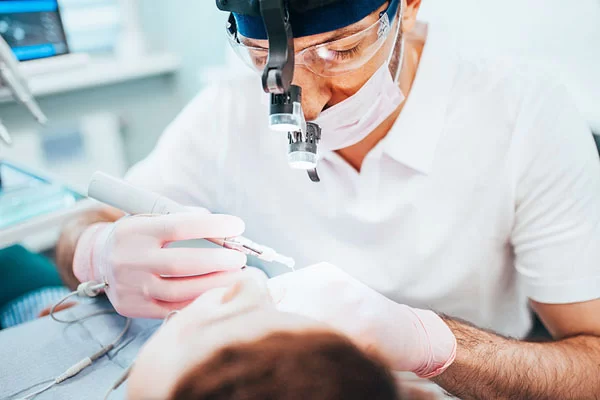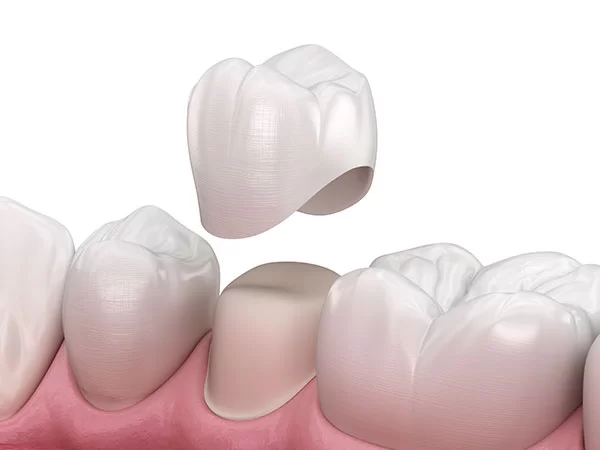Please note we may not offer this service at our office. Call (614) 771-6060 for more information.
Discover How a Metal Dental Crown Can Restore Your Tooth
When considering dental crowns, there are several types available. One of the most frequently used materials is metal. Metal-based dental crowns have been utilized for decades and remain a popular choice among many patients.
Gain more insight into metal dental crowns with guidance from our dentist in Hilliard, OH, by calling (614) 771-6060 today.

What Are Metal Dental Crowns?
Metal dental crowns have been utilized for many years and remain a favored option for numerous patients. These crowns are well-known for their robustness and longevity, making them an excellent choice for molars. A metal crown is also designed to resist wear and tear, capable of enduring substantial pressure.
What Type of Material is Used for a Metal Dental Crown?
There are several types of metal dental crowns available, including:
- Gold crowns are crafted from a gold alloy known for its high biocompatibility and resistance to corrosion.
- Silver crowns consist of a mix of silver, tin, and other metals. They’re durable and cost-effective but may discolor over time.
- Platinum crowns are made from a platinum alloy, which is strong, durable, and corrosion-resistant. They tend to be pricier compared to other metal crowns.
- Palladium crowns incorporate palladium, gold, and additional metals, making them a suitable choice for patients with metal sensitivities.
- Base metal alloy crowns are composed of non-noble metals like nickel, chromium, and titanium. They’re strong, durable, and economical but may cause allergic reactions in some individuals.
Benefits of a Metal Crown
Opting for a metal crown comes with several advantages, including:
- Strength and Durability: These crowns are incredibly robust and can endure significant pressure, making them ideal for back teeth.
- Longevity: With proper care and maintenance, they can last for many years, often exceeding 20 years.
- Preservation of Natural Tooth Structure: They require minimal removal of the natural tooth structure compared to other crown types, such as porcelain or ceramic.
- Resistance to Wear and Tear: They are less prone to chipping or breaking compared to other crown materials.
- Biocompatibility: Many metals used in dental crowns, such as gold and palladium, are highly biocompatible and unlikely to trigger allergic reactions.
Drawbacks of Metal Crowns
When considering a metal crown, it’s important to be aware of several potential downsides, such as:
- Appearance: Unlike tooth-colored crowns, metal crowns can be more noticeable, particularly when placed on front teeth.
- Thermal Conductivity: Metal crowns can conduct heat and cold, potentially causing discomfort for some patients.
- Wear on Opposing Teeth: Due to their hardness, metal crowns may cause more wear on the opposing teeth compared to other crown materials.
- Expense: Depending on the alloy used, metal crowns can be more costly than other types of crowns.
- Allergic Reactions: Although uncommon, some patients may experience allergies to certain metals in dental crowns, leading to inflammation and other health concerns.

The Metal Dental Crown Process
Preparation and Impressions
To begin the process of getting a metal crown, your dentist will first prepare the tooth. This involves removing any decay or damage and shaping the tooth to accommodate the crown. If the tooth lacks sufficient structure to support the crown, your dentist may need to build it up.
After preparing the tooth, your dentist will take impressions of both the tooth and the surrounding teeth. These impressions are sent to a dental lab, where a custom crown is crafted to fit your tooth and bite precisely. While waiting for the permanent crown, a temporary crown will be placed on the tooth to protect it.
Crown Placement
Once the permanent crown is ready, you’ll return to the dental office for the placement procedure. The temporary crown will be removed, and the new crown will be positioned on the tooth to check the fit and make any necessary adjustments.
When the fit is ideal, your dentist in Hilliard will secure the crown using a dental adhesive. They’ll also verify your bite to ensure the crown aligns correctly with the opposing teeth.
Follow-Up Care
After the crown is in place, you’ll receive guidance on how to care for it. Maintaining good oral hygiene, including regular brushing and flossing, is essential to keeping both the crown and the surrounding teeth healthy.
Metal Crown Costs
The cost of metal dental crowns can vary based on several factors, such as the location, the dentist’s expertise, the complexity of the dental case, and any additional procedures needed. Generally, metal crowns tend to be more cost-effective compared to other types of dental crowns due to the lower cost of materials and the straightforward fabrication process.
Typically, the price for a metal crown ranges from $800 to $1,500 per tooth. However, this is only an estimate, and actual costs can differ significantly. Dental insurance may also impact the out-of-pocket expenses for a metal crown, as some plans may cover a portion of the cost.
Other Crown Options
Due to the potential for metal crowns to affect the appearance of your smile, many individuals opt for alternative crown solutions:
- Porcelain-Fused-to-Metal (PFM) Crowns: These crowns combine a metal base with a porcelain overlay. The porcelain layer offers a more natural tooth-like appearance, while the metal provides strength. However, if gums recede, the metal base might become visible through the porcelain.
- All-Porcelain or All-Ceramic Crowns: Composed entirely of porcelain or ceramic, these crowns are celebrated for their excellent aesthetic qualities. They mimic the translucence and color of natural teeth. Although they may not be as strong as metal or PFM crowns, advancements in materials have enhanced their durability.
- Zirconia Crowns: Zirconia is an exceptionally strong ceramic material. It can be used alone or layered with porcelain for improved aesthetics. Its strength rivals that of metal, making it suitable for both front and back teeth.
- Composite Resin Crowns: Made from a blend of plastic and glass, these crowns are more affordable than other types. They offer aesthetic appeal but may wear down more quickly than other materials.

Frequently Asked Questions
Are metal crowns safe?
Yes, metal crowns are typically regarded as safe. They have been in use for decades and boast a strong history of successful outcomes. However, some individuals may have allergies to certain metals used in dental crowns, so it’s crucial to discuss any allergies or concerns with your dentist.
How long do metal crowns last?
Metal crowns are known for their longevity and can often last 20 years or more with proper care and maintenance. The lifespan of a dental crown depends on factors such as oral hygiene practices, diet, and overall wear and tear.
Can you get an MRI with metal crowns?
While metal crowns are generally safe, they can interfere with certain medical procedures, including MRI (magnetic resonance imaging). Metal can create artifacts on the MRI image, potentially complicating the interpretation of results. If you have a metal dental crown, be sure to inform your healthcare provider before undergoing an MRI so they can take the necessary precautions.
Find Out if Metal Crowns Suit Your Dental Needs
Metal crowns provide a robust and long-lasting option for those addressing tooth decay or other dental issues. Consult with Dr. Nathan Desai to explore your dental crown choices and find the perfect fit for your individual needs.
Contact our Hilliard dental office at (614) 771-6060 to book a consultation and start your journey toward a healthy, radiant smile. We are proud to serve patients from Columbus, Dublin, Upper Arlington, Grove City, Westerville, and the surrounding areas.






